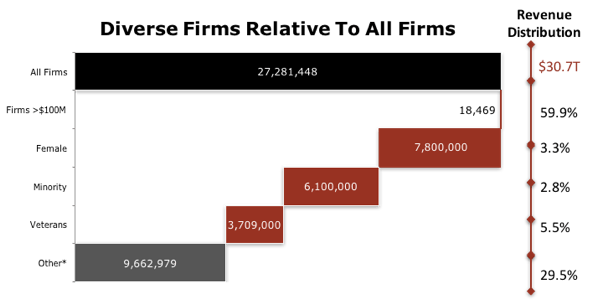From spurring local job growth to building environmentally-friendly supply chains, inclusive procurement can create positive change.
When I graduated from Wharton in 1995 and decided to pursue a career in management consulting at A.T. Kearney, I had grand visions of helping one of our multinational clients grow revenue through a high profile M&A transaction. Instead, I was assigned to a global strategic sourcing engagement for one of the most recognizable corporate brands in the world. I didn’t know what strategic sourcing was at the time, but I quickly learned that it was an approach to supply-chain management that enabled an organization to leverage its purchasing power to optimize the value it received from suppliers. I began to realize then that the often-overlooked area of procurement had the potential to unlock corporate value.
I had no idea that that first assignment would play such a role in shaping my career. In the 20 years since then, I have remained in supply chain and procurement, doing stints with other global consultancies including Accenture and working as chief procurement officer at Cincinnati Bell and now as founder and CEO of ConnXus, where our software helps create more inclusive and sustainable supply chains. My cumulative corporate and entrepreneurial experience has provided me with a unique perspective on procurement, and as a result I believe inclusive procurement can change the world.
Statistics That Matter
Consider these statistics supported by the chart below (from a prior blog post):
- 99.9 percent of all U.S. firms are in the small business category.
- Women- and minority-owned companies represent more than 50 percent of the total small business population.
- More than half of the American workforce of about 142 million people is employed by small businesses.
- Small businesses have generated more than 65 percent of new jobs over the past 20 years.
- The number of minority-owned businesses grew nearly 50 percent between 2002 and 2007—almost three times the rate of all firms in the U.S.

As noted above, nearly 60 percent of the more than $30 trillion in annual revenue generated by U.S. firms is produced by a small group that represents less than one-tenth of 1 percent of the national business population. Although minority and female-owned firms represent more than 50 percent of today’s total U.S. business population, they generate just over 6 percent of total revenue.
As one of the fastest-growing sectors of small business, minority-owned businesses in particular demand our attention. Together, they generate over $500 billion in sales each year, comprise 21.3 percent of all non-farm businesses in the country, and provide 5 percent of total employment.
Innovation
It is no secret that start-ups are disrupting multi-billion dollar industries. The top five publicly traded companies didn’t even exist 25 years ago. These companies achieved success by introducing innovative solutions to the market that delivered value in the form of lower cost or enabled enhanced revenue. Corporate procurement professionals are often the gatekeepers positioned to discover these new innovations. I recently spoke at a corporate innovation event and shared an example from the food and beverage industry, where 96 percent of the four-year industry growth came by way of start-ups, totaling $17 billion.
Job Creation
When I was head of purchasing or otherwise in a position of influence, I made it a point to identify spend categories where we could introduce new suppliers into the supply chain. I knew awarding a contract to an innovative, rapidly growing company would have a much greater impact on local job growth than simply sticking with the status quo. ConnXus now boasts an enterprise customer list that represents a significant portion of the Fortune 1000. This was made possible because one major corporation was willing to give new suppliers a chance. That contract alone doubled the size of our company in year three of our existence. The supply chain professionals at this company now take great pride in the fact that they played a key role in the development of an innovative start-up that has created 21 new jobs and is serving customers in eight countries.
Economic Impact
An inclusive supplier portfolio enables supply chain and procurement professionals to leverage spending strategically in the supplier selection process. For example, we were recently able to help a customer look back to see that the $30 million that they spent with 55 diverse suppliers in a major urban market was directly responsible for supporting over 4,000 jobs. This company is now trying to determine how they can leverage this sort of information ahead of future supplier-selection decisions. Think about the impact that this can have on unemployment.
Social Impact
Every supply chain is at risk of inadvertently supporting slavery and child labor. Organizations like Made In A Free World (MIAFW) are doing something about it. MIAFW has built software that locates and addresses these risks. This innovative software solution enables procurement and supply chain professionals to play a key role in ending forced economic exploitation.
Environmental Impact
Organizations such as EcoVadis are making it easier for companies to monitor and measure the environmental practices of their suppliers. This allows procurement professionals to help build more environmentally-friendly supply chains.
Shareholder Value
Increasing profits and enhancing shareholder value are not exactly world-changing concepts. However, it is worth emphasizing the value that procurement plays in controlling the cost of goods sold. For many companies, total external purchases represent a third of total revenue. That means every purchasing dollar saved falls directly to the bottom line; for a billion dollar company, it could represent a 14 percent increase in earnings. This is before considering the additional benefits (reputation, loyalty, innovation, new market access, etc.) associated with a more inclusive network of suppliers.
In my opinion, procurement and supply chain is positioned to have the most broad-sweeping impact of any other role within a corporation. From being on the front end of identifying innovative suppliers, to selecting suppliers that maximize local job growth, procurement professionals are positioned to pull the levers that create the optimal supplier mix.


























